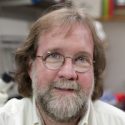Influenza researcher Yoshihiro Kawaoka wins Breakthrough Award
The University of Wisconsin–Madison’s Yoshihiro Kawaoka has been recognized as a 2014 Popular Mechanics Breakthrough Award recipient for his efforts to understand and prevent pandemic influenza.
He joins a list of prominent innovators, scientists and engineers selected for the award over the past decade for their world-changing contributions, including: SpaceX and Tesla Motors CEO Elon Musk; XPRIZE Foundation founder Peter Diamandis; and humanitarian engineer Amy Smith.
Yoshihiro Kawaoka
“I am just so happy,” says Kawaoka, a UW–Madison professor of veterinary medicine who studies influenza and Ebola viruses. “I think I don’t believe it.”
In recent years, Kawaoka has found himself at the center of controversy surrounding research on highly pathogenic influenza and other sensitive pathogens known as select agents. His studies to understand, monitor, treat and potentially prevent pandemic influenza have often been misrepresented and misunderstood.
However, according to Popular Mechanics — a science and technology-focused magazine published by Hearst Magazines — Kawaoka was chosen despite the controversy because his work studying mutations in viruses that are currently found in nature and carry pandemic potential could “help protect humanity.”
“We know Ebola is a big issue in Africa right now, but Kawaoka’s investigations into influenza — which is in fact a constant and greater threat to public health in the United States — could help us avoid or beat back the type of flu viruses that have erupted into deadly pandemics in the past,” says Ryan D’Agostino, Popular Mechanics editor-in-chief.
“Kawaoka’s investigations into influenza … could help us avoid or beat back the type of flu viruses that have erupted into deadly pandemics in the past.”
Ryan D’Agostino
Other Popular Mechanics award winners this year include the robotics company Boston Dynamics for its rescue robot, Atlas; NASA, for a lunar orbiter named Ladee; and the National Audubon Society for a study on the impact of climate change on future bird populations. Each will be recognized today at a luncheon and reception at Hearst Tower in New York City.
The magazine will also feature a profile of Kawaoka in its November issue, available October 14, 2014.
The year-round selection process for the Breakthrough Awards begins with a list of nominees typically topping 100. The initial nominees are narrowed down by Popular Mechanics editors and a researcher — who consults with hundreds of governmental, academic and industry leaders in science, engineering and technology — and final decisions are made once a year.
For Kawaoka, who often feels he is portrayed as the “bad guy” for his work, this award carries significant meaning.
“I don’t put any awards on the wall,” Kawaoka says. “This one, I will.”



